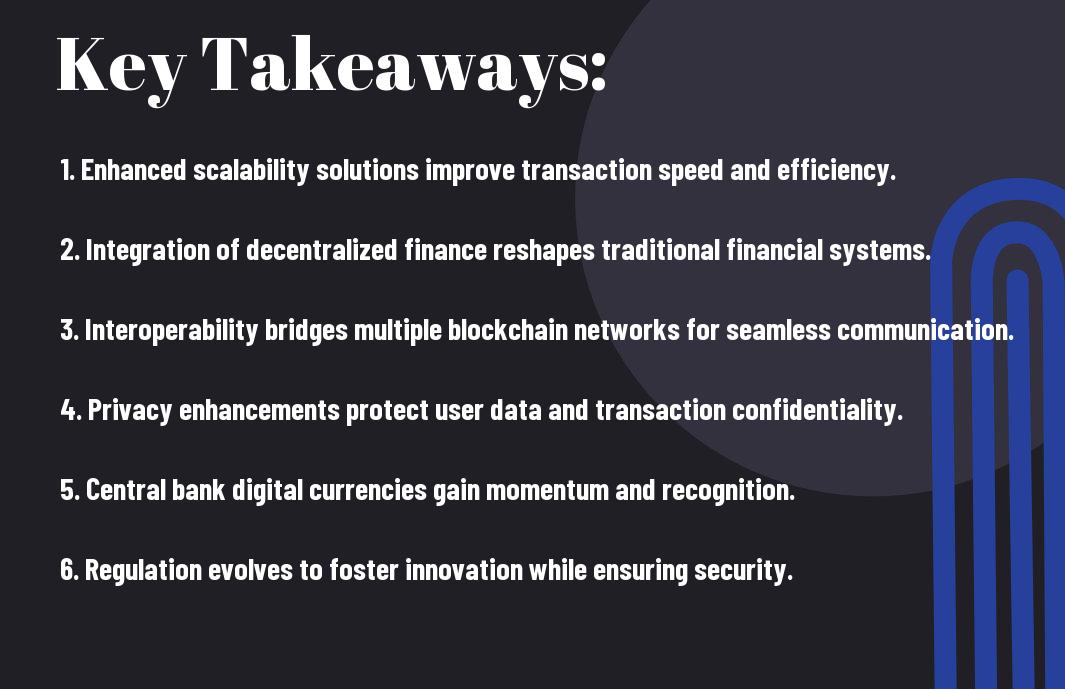Now Reading: Blockchain Technology Updates – 9 Innovative Steps Transforming The Crypto Landscape
-
01
Blockchain Technology Updates – 9 Innovative Steps Transforming The Crypto Landscape
Blockchain Technology Updates – 9 Innovative Steps Transforming The Crypto Landscape

Most people are aware of the revolutionary potential of blockchain technology, but many may not realize how transformative innovations are currently reshaping the crypto landscape. In this blog post, you will discover nine key updates that are not only enhancing security but also increasing usability and driving mainstream adoption. These steps are pivotal as they address concerns and tap into the immense possibilities within the digital asset realm. Stay informed and empowered as you navigate this rapidly evolving space.
Key Takeaways:
- Decentralization: Blockchain technology continues to drive decentralization, enabling greater autonomy and security for users across various sectors.
- Interoperability: New developments are focusing on enhancing interoperability among different blockchains, facilitating seamless transactions and data sharing.
- Scalability Solutions: Innovative approaches such as Layer 2 solutions are being implemented to improve transaction speeds and reduce congestion on primary networks.
- Regulatory Compliance: The evolving landscape is leading to increased efforts towards creating compliant blockchain applications that adhere to regulatory standards.
- Green Initiatives: Sustainability efforts are being prioritized, with new algorithms and technologies aimed at reducing the environmental impact of blockchain operations.

Overview of Blockchain Technology
As you research into blockchain technology, it’s vital to grasp its transformative potential in various sectors. Blockchain is not just a buzzword; it represents a decentralized layer of security and transparency, which can fundamentally change how you conduct transactions, store data, and verify identities.
Definition and Functionality
Before you explore its applications, it’s important to understand that blockchain is a distributed ledger technology that securely records transactions across multiple computers. This ensures that every transaction is transparent and immutable, meaning it cannot be altered once recorded.
Key Characteristics
Blockchain technologies possess several defining features that set them apart. Decentralization minimizes the risk of failure by distributing control, while transparency enhances trust among participants. Furthermore, security is reinforced through cryptographic techniques, making unauthorized changes virtually impossible.
In addition to these characteristics, the modularity of blockchain allows for customization according to the specific needs of your business. Features like smart contracts automate processes and reduce human error, while scalability lets you expand operations without sacrificing performance. These traits make blockchain an exciting prospect for any industry looking to innovate and improve efficiency.
Recent Innovations in Blockchain
Any discussion on the evolution of blockchain must address the innovative strides being made in the sector. With numerous applications emerging, it’s necessary to stay updated on the latest developments. For a comprehensive overview, you can refer to the Blockchain – Innovation Landscape Brief, which highlights key trends and innovations shaping the industry.
Layer 2 Solutions
Around the world, Layer 2 solutions are gaining traction as a way to enhance blockchain’s scalability without compromising security. By building additional layers on top of existing blockchains, these solutions reduce transaction fees and increase throughput, making your interactions on the blockchain more efficient and affordable.
Interoperability Protocols
Blockchain networks are becoming increasingly interconnected, thanks to innovative interoperability protocols. These protocols allow different blockchains to communicate with one another, enhancing your ability to leverage diverse platforms and applications seamlessly.
Solutions focused on interoperability are designed to connect various blockchain ecosystems, enabling a fluid exchange of information and assets. This means you can facilitate transactions across different networks effortlessly, making your blockchain experience more versatile. However, it’s necessary to consider potential security risks, as increased connectivity may expose your data to vulnerabilities. On the upside, interoperability fosters a more robust and collaborative crypto landscape, allowing you to unlock new use cases and opportunities that contribute to the growth of your digital assets.
Advancements in Security
For anyone navigating the world of cryptocurrency, staying informed about advancements in security is paramount. As the digital landscape evolves, so do the threats, necessitating robust measures to protect your assets. Recent developments emphasize improved protocols and frameworks designed to enhance the security of blockchain networks, ensuring that your transactions and data remain safe from cyber attacks.
Cryptographic Enhancements
An innovative wave in blockchain technology involves cryptographic enhancements that elevate security standards. These improvements encompass advanced encryption techniques and cryptographic algorithms that safeguard your data and transactions, making it significantly more challenging for malicious actors to compromise your assets.
Decentralized Identity Solutions
For individuals seeking greater control over their personal information, decentralized identity solutions present a game-changing approach. This technology empowers you to manage your digital identity without relying on a single entity, thus enhancing privacy and security in your transactions and interactions.
Consequently, by adopting decentralized identity solutions, you can mitigate risks associated with identity theft and data breaches. This approach allows for greater autonomy over your personal data, enabling you to share only the information necessary for transactions while keeping other details private. The potential to streamline processes, reduce fraud, and enhance security with blockchain-verified identities ensures your digital presence is protected in a world increasingly focused on data privacy and control.
Influence on Financial Services
After the advent of blockchain technology, financial services have undergone a significant transformation. The decentralization of financial assets has not only enhanced security and transparency but has also reduced the need for intermediaries, enabling you to conduct transactions with greater efficiency. Traditional banks are now adapting to this innovation, incorporating blockchain solutions to streamline processes and improve customer experiences, ultimately reshaping the landscape of finance as you know it.
Decentralized Finance (DeFi) Trends
The emergence of DeFi is revolutionizing how you interact with financial services. By eliminating intermediaries, you gain access to a range of services, including lending, borrowing, and trading, all powered by smart contracts. DeFi platforms promote financial inclusion, giving you opportunities to manage your assets in ways previously unavailable, while also lowering transaction fees and increasing transaction speeds in the process.
Central Bank Digital Currencies (CBDCs)
Digital currencies issued by central banks are rapidly gaining traction worldwide. You may soon experience a shift in how you use money, as CBDCs aim to combine the advantages of digital currency with the backing and stability of your national government. This could lead to enhanced payment systems, greater financial inclusivity, and the reduction of illegal activities commonly associated with cash transactions.
DeFi and CBDCs represent two sides of the same coin in the evolving financial ecosystem. With DeFi providing an alternative to traditional financial products and services, you’re empowered to take control over your financial transactions. Conversely, CBDCs can enhance trust in digital transactions while offering government oversight to mitigate risks associated with cryptocurrencies. However, the rise of both can introduce challenges, such as regulatory scrutiny and the potential for systemic risks. You must stay informed about their implications as they continue to reshape the future of finance.
Impact on Supply Chain Management
To understand how blockchain is revolutionizing supply chain management, you should explore its ability to enhance efficiency and security. With the integration of this technology, transparency increases significantly, making it easier to monitor transactions and reduce fraud. As discussed in the article How the Trump Administration Could Transform …, the regulatory landscape may further influence these advancements, positioning blockchain as a key player in modern logistics.
Traceability and Transparency
Traceability is one of the major benefits of blockchain technology in supply chains. By providing an immutable record for each transaction, you can track the journey of products from origin to consumer, ensuring authenticity and reducing the risk of counterfeit goods. This enhanced transparency can foster trust between suppliers and customers, ultimately strengthening brand loyalty.
Smart Contracts Integration
About smart contracts, they automate transactions and agreements within the supply chain, significantly reducing delays and minimizing the need for intermediaries. By self-executing when predefined conditions are met, these contracts ensure that all parties fulfill their obligations promptly, enhancing overall efficiency.
Transparency is a key advantage of smart contracts. Once deployed on the blockchain, these contracts are accessible to all parties involved, ensuring that you can verify compliance and monitor performance in real time. This reduces the chances of disputes and enhances accountability. Additionally, by eliminating the need for manual processing, your operations can become more efficient and cost-effective. However, the reliance on code introduces certain risks, as any vulnerabilities in the smart contract can be exploited. It is thus crucial for you to invest in thorough testing and audits to avoid potential pitfalls.
Transforming Governance and Voting
All across the globe, blockchain technology is reshaping governance and voting systems, providing a more transparent, secure, and efficient way to conduct democratic processes. By leveraging decentralized networks, individuals can participate in elections with greater confidence, ensuring that their voices are heard while reducing the risks associated with fraud and manipulation. This shift not only enhances the integrity of voting systems but also empowers citizens to engage more actively in their governance.
Blockchain-based Voting Systems
By utilizing blockchain-based voting systems, you gain access to a reliable method for casting your vote, significantly minimizing the chances of tampering and ensuring that each vote is accurately recorded. These systems harness the power of cryptography and decentralized ledgers, allowing for transparent audits that can instantly verify the election results while maintaining voter anonymity.
Enhanced Civic Engagement
Beside increasing security, blockchain technology also promotes enhanced civic engagement by making the voting process more accessible to you and your community. With mobile and online voting options becoming available, digital literacy now plays a pivotal role in empowering individuals to participate actively in their governance.
Even more significantly, enhanced civic engagement through blockchain fosters an environment where you are encouraged to stay informed and involved in political discourse. The accessibility of voting and information encourages you to hold your elected officials accountable. Furthermore, this transparency facilitates a greater sense of trust in the electoral process, empowering your community to take an active role in democracy while reducing the fear of disenfranchisement and ensuring that your opinions and choices are accurately reflected in the governance systems.
To wrap up
Conclusively, understanding the recent updates in blockchain technology can significantly enhance your perspective on the evolving crypto landscape. By embracing these nine innovative steps, you can better navigate the complexities of digital currencies and take advantage of emerging opportunities. Staying informed about these developments empowers you to make educated decisions, whether you’re an investor, developer, or simply a crypto enthusiast. Your proactive engagement with these trends will ensure that you are well-positioned to benefit from the future of blockchain technology.
FAQ
Q: What are the most significant updates in blockchain technology as of 2023?
A: As of 2023, several updates have greatly transformed the blockchain landscape. Innovations include enhanced scalability solutions like sharding and layer-2 protocols, integration of blockchain with artificial intelligence, improved interoperability between different blockchains, the rise of decentralized finance (DeFi) platforms, and advancements in regulatory compliance technologies. These steps contribute to a more robust and adaptable crypto ecosystem.
Q: How is AI influencing blockchain technology?
A: AI is playing a pivotal role in improving blockchain technology by enhancing data analysis, optimizing smart contracts, and detecting fraudulent activities. With predictive analytics and machine learning techniques, AI can provide insights for better decision-making. Moreover, AI algorithms can help manage blockchain networks more efficiently, ensuring a faster and more streamlined process.
Q: What impact does decentralized finance (DeFi) have on traditional banking?
A: DeFi is significantly disrupting traditional banking by offering services such as lending, borrowing, and trading directly on blockchain platforms without intermediaries. This model increases accessibility to financial services, lowers costs, and empowers users with control over their assets. As DeFi continues to grow, traditional banks may need to adapt their services to remain competitive in this evolving financial landscape.
Q: Are there any recent advancements in blockchain security?
A: Yes, recent advancements in blockchain security include the development of more robust consensus mechanisms, the application of zero-knowledge proofs, and enhanced encryption methods. These innovations aim to protect user data, ensure transaction integrity, and reduce the risk of hacks. Additionally, the integration of formal verification methods helps ensure that smart contracts function as intended, further bolstering security.
Q: How do regulatory changes affect the blockchain industry?
A: Regulatory changes create both challenges and opportunities for the blockchain industry. Tightening regulations can provide a framework for legitimacy and consumer protection, helping to establish trust and acceptance. However, overly stringent regulations may stifle innovation and limit market growth. The balance between regulation and innovation is necessary for the sustainable development of blockchain technology.
























